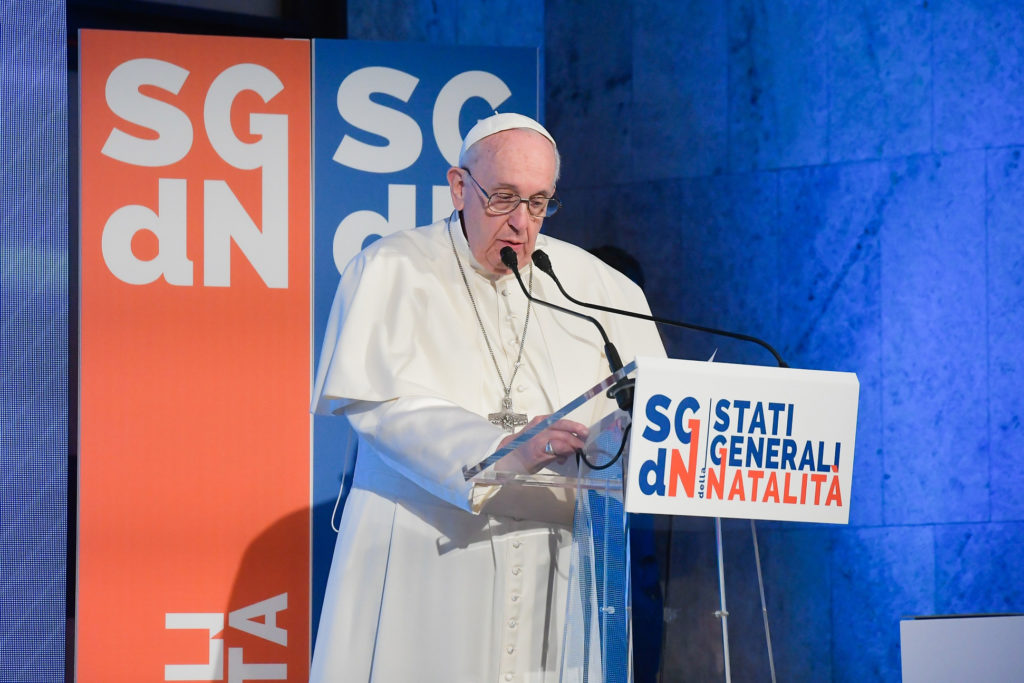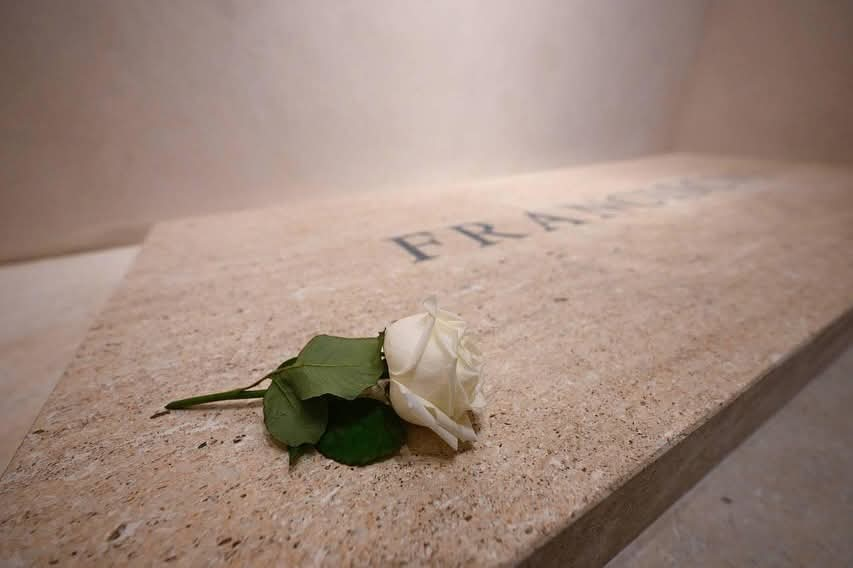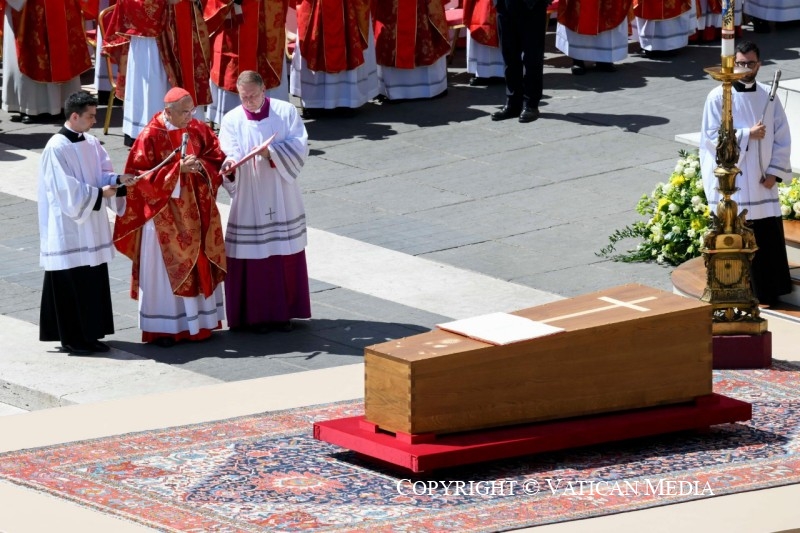Pope Francis: ‘Rediscover Courage… Choose Life’
The Holy Father Opens Italian Demographic Conference on General States of Birth

“Dear friends, let us help one another to rediscover the courage to give, the courage to choose life.”
Those were the words of Pope Francis on May 14, 2021, calling children a gift, as he opened the first edition of the General States of Birth, an online initiative organized by the Forum of Family Associations. The online Italian event was hosted in the Conciliazione Auditorium in Rome.
On his arrival, Pope Francis was welcomed by the Auditorium’s President, Dr. Francesco Carducci; by the President of the Council of Ministers of the Italian Republic, The Honourable Mario Draghi; and by the National President of the Forum of Family Associations, Gigi De Palo. Then the Holy Father greeted the Authorities present and the participants in the meeting.
“We have forgotten the primacy of the gift,— the primacy of the gift! –, source code of common living,” the Holy Father lamented. “It has happened especially in the more advanced, more consumerist societies. We see, in fact, that where there are more things, often there is more indifference and less solidarity, more closure, and less generosity. Let us help one another not to get lost in the things of life, to rediscover life as the sense of all things.”
The Pope went on to explain that in the post-pandemic reset it was essential to support families and avoid a demographic winter. In particular, he criticized the tendency in the workplace to make women feel ashamed to want children.
“Children are the hope that constitutes the rebirth of people!” Francis proclaimed. “It’s urgent to offer young people guarantees of sufficiently stable employment, home security, attractive enough so as not to leave the country.”
Pope Francis offered three words to keep in mind in the restoration of the family:
- Gift: “Every gift is received, and life is the first gift that each one has received.”
- Sustainability: “Sustainability rhymes with responsibility: it’s the time of responsibility to have society flourish. Fundamental here, in addition to the primary role of the family, is the school.”
- Solidarity: Sustainability is in need of a spirit and this spirit — the third word I propose to you — is solidarity. I also associate to it an adjective: just as there is need for generational sustainability, there must also be a structural solidarity.
The Holy Father concluded with a note of hope and encouragement for those present and viewing online:
“Sometimes it will seem that you are crying in the desert, that you fight against windmills. But go on, don’t give up because it’s good to dream, to dream of the good, and to build the future. And without births, there is no future.”
Here is a translation of the address the Pope gave at the opening of the General States of Birth.
* * *
The Holy Father’s Address
Dear Brothers and Sisters,
I greet you warmly and I am grateful to the President of the Forum of Family Associations, Gianluigi De Palo for the invitation and for his introductory words. I thank Doctor Mario Draghi, President of the Government, for his clear and hopeful words. I thank all of you, who are reflecting today on the urgent subject of birth, fundamental to reverse the downward tendency and to restart Italy beginning from life, from the human being. And it’s good that you do it together, involving companies, banks, the culture, the media, sports, and entertainment. In reality, there are many other people here with you: there are young people that dream. The data states that the majority of young people want to have children. However, their dreams of life, buds of the country’s rebirth, collide with a demographic winter still cold and dark: only half of young people think they will succeed in having two children in the course of their life.
Thus for years, Italy finds itself with the lowest number of births in Europe, in what is becoming the old Continent, no longer for its glorious history, but for its advanced age. In 2020 our country, where every year is as if a city of over two hundred thousand inhabitants disappeared, reached the lowest number of births of the national unit: not only because of COVID but because of a continuous, progressive downward tendency, an ever more frigid winter.
Yet all this still doesn’t seem to have attracted general attention, focused on the present and the immediate. The President of the Republic confirmed the importance of births, which he described as “the most critical point of reference of this season, saying that “families are not the connective fabric of Italy, the families are Italy” (Audience to the Forum of Family Associations, February 11, 2020). How many families in these months have had to do the extraordinary, dividing the home between work and school, with parents who became teachers, IT technicians, workers, psychologists! And how many sacrifices are required of grandparents, true lifeboats of families! But not only that: they are the memory that opens us to the future.
For the future to be good, therefore, it is necessary to take care of families, in particular, the young ones, assailed by worries that risk paralyzing life projects. I am thinking of the loss because of the uncertainty of work, I am thinking of the fears given the costs, which are ever less sustainable for children’s growth. They are fears that can swallow the future; they are quicksand that can sink a society. I’m thinking also, with sadness, of the women that at work are discouraged to have children or must hide their tummy. How is it possible that a woman should feel ashamed of the most beautiful gift that life can offer? Not women, but society must be ashamed because a society that doesn’t welcome life stops living. Children are the hope that constitutes the rebirth of people! Finally, it was decided in Italy to transform into law a benefit, defined as unique and universal, for every child that is born. I express appreciation to the Authorities and I hope that this benefit will meet the concrete needs of families that have made and are making such sacrifices, and mark the start of social reforms that put children and families at the center. If at present, families are not at the center, there won’t be a future; but if families start again, everything starts again.
I would now like to look in fact at this restart and offer you three thoughts that I hope are useful in view of a hoped-for spring, which will raise us from the demographic winter. The first thought revolves around the word gift. Every gift is received, and life is the first gift that each one has received. No one can give it to himself. First of all, there was a gift. It’s a first that in the course of life we forget, always intent on looking at what comes after, to what we can do and have. However, first of all, we have received a gift and we are called to pass it on. And a child is the greatest gift for all and comes before all. Linked to a child, to every child us this word: first. As a child is expected and loved before he comes to light, so we must put children first if we want to see the light again after the long winter. Instead, “the lack of children, which causes the aging of the population, affirms implicitly that everything ends with us, that only our individual interests count” (Encyclical Letter Fratelli Tutti, 19). We have forgotten the primacy of the gift,— the primacy of the gift! –, source code of common living. It has happened especially in the more advanced, more consumerist societies. We see, in fact, that where there are more things, often there is more indifference and less solidarity, more closure, and less generosity. Let us help one another not to get lost in the things of life, to rediscover life as the sense of all things.
Dear friends, let us help one another to rediscover the courage to give, the courage to choose life. There is a phrase of the Bible that can help anyone, also an unbeliever, to direct his choices. Jesus says: “Where your treasure is, there will your heart be also” (Matthew 6:21). Where is the treasure, the treasure of our society? Is it in children or in finances? What is it that attracts us, the family or the turnover? There must be the courage to choose what comes first because the heart will be read there. The courage to choose life is creative, because it doesn’t accumulate or multiply what already exists, but opens to novelty, to surprises: every human life is the real novelty, which doesn’t know a before or an after in history. We have all received this unrepeatable gift and the talents we have to serve to be passed on, from generation to generation, God’s first gift, the gift of life. Linked to this passing on is the second thought that I would like to offer. It turns around the word sustainability, keyword to build a better world. There is often talk of economic, technological, and environmental sustainability and so on. However, it’s also necessary to talk about generational sustainability. We won’t be able to fuel production and to protect the environment if we are not attentive to families and to children. Sustainable growth passes through here. History teaches this. During the phases of reconstruction following wars, which in past centuries have devastated Europe and the world, there was no restarting without an explosion of birth, without the capacity to infuse trust and hope in the young generations. Today we also find ourselves in a restarting situation, as difficult as it is full of expectations: we cannot follow myopic growth models, as if to prepare for tomorrow, only some hasty adjustment was useful. No, the dramatic numbers of births and those frightening ones of the pandemic call for change and responsibility.
Sustainability rhymes with responsibility: it’s the time of responsibility to have society flourish. Fundamental here, in addition to the primary role of the family, is the school. It cannot be a factory of notions to pour on individuals. It must be the privileged time for encounter and human growth. At school, one doesn’t mature only through grades, but through the faces one meets. And it is essential for young people to come into contact with lofty models, which form hearts in addition to minds. Example does a lot in education. I’m also thinking of the realms of entertainment and sport. It’s sad to see models that are only concerned with appearance, always beautiful, young and in shape. Young people don’t grow thanks to fireworks of appearance; they mature if attracted by someone who has the courage to follow great dreams, to sacrifice himself for others, to do good to the world in which we live. And to keep young doesn’t come from doing selfies and touch-ups, but from being able to be mirrored one day in the eyes of one’s children. Sometimes, instead, the message runs that to be fulfilled means to earn money and have success, while children seem almost a diversion, which must not hinder one’s personal aspirations. This mentality is gangrene for society and renders the future unsustainable.
Sustainability is in need of a spirit and this spirit — the third word I propose to you — is solidarity. I also associate to it an adjective: just as there is need for generational sustainability, there must also be a structural solidarity. The spontaneous and generous solidarity of many has made it possible for many families, in this harsh period, to go on and to address the growing poverty. However, one cannot stay in the ambit of emergency or of the provisional; it’s necessary to give stability to the structures of support to families and help to births. Indispensable is a policy, economy, information, and culture that promotes births courageously.
In the first place, there must be family policies of ample breadth, farsighted: not based on research of the immediate consensus, but on the long-term growth of the common good. Here is the difference between managing public affairs and being good politicians. It’s urgent to offer young people guarantees of sufficiently stable employment, home security, attractive enough so as not to leave the country. It’s a task that also concerns closely the realm of the economy: how good it would be to see the number of businesses and companies grow that, in addition to producing useful things, promote lives, that are careful not ever to exploit people with unsustainable conditions and hours of work, which are able to distribute part of the revenues to workers, from the point of view of contributing to a priceless development, that of families! It’s a challenge, not only for Italy but for many countries, often rich in resources, but poor in hope. Solidarity must also be spelled out in the realm of the precious service of information, which affects life so much and on how it is told. Turn of events and strong words are in fashion, but the criterion to form by informing is not the audience, it’s not controversy, but human growth. Of use is “a family-format information,” where there is talk of others with respect and delicacy as if they were one’s parents. And which at the same time brings to light the interests and plots that harm the common good, the maneuvers that revolve around money, sacrificing families and people. Solidarity convokes then the realms of culture, of sport and of entertainment to promote and value births. The culture of the future can’t be based on the individual and on the mere satisfaction of his/her rights and needs. There must be a culture that cultivates the chemistry of being together, the beauty of the gift, the value of sacrifice.
Dear friends, I would like finally to say to you the simplest and sincerest word: thank you. Thank you for the General States of Birth, thank you to each one of you and to all those that believe in human life and in the future. Sometimes it will seem that you are crying in the desert, that you fight against windmills. But go on, don’t give up because it’s good to dream, to dream of the good, and to build the future. And without births, there is no future. Thank you.
© Libreria Editrice Vatican
[Original text: Italian] [Exaudi’s translation by Virginia M. Forrester]
Related

Cardinal Parolin at the Novendalia Mass: “Mercy leads us to the heart of faith”
Exaudi Staff
27 April, 2025
8 min

Pope Francis’ Tomb in Santa Maria Maggiore
Exaudi Staff
27 April, 2025
1 min

Mercy and the joy of the Gospel are two key concepts of Pope Francis
Exaudi Staff
26 April, 2025
9 min

Thousands of faithful bid farewell to Pope Francis in St. Peter’s Square
Exaudi Staff
26 April, 2025
2 min
 (EN)
(EN)
 (ES)
(ES)
 (IT)
(IT)

